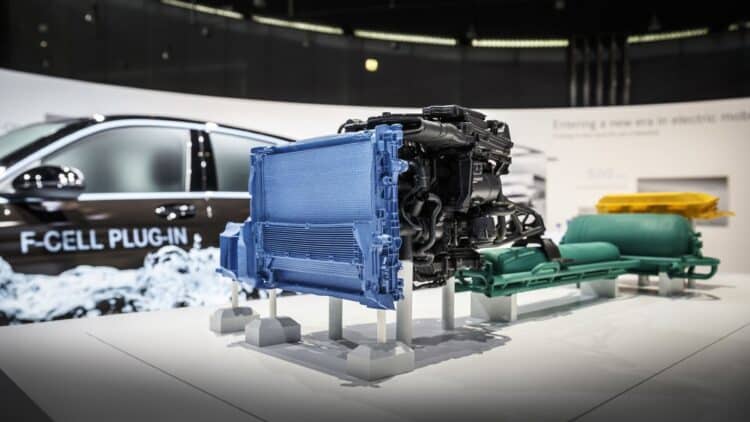Mercedes-Benz has introduced a trailblazing engine technology that operates exclusively through hydrogen power. The innovation introduces essential changes to automotive development because it may make conventional electric cars unnecessary. The article investigates how hydrogen-powered engines as disruptive technology affects future transportation systems.
The Mercedes-Benz GLC F-CELL
Users of the Mercedes-Benz GLC F-CELL have access to hydrogen fuel cell systems that combine with battery operation. Users of the GLC F-CELL gain extensive range capabilities through its combined hydrogen fuel cell technology features and electric charging system. The dual system design provides motorists with several possibilities to refill their vehicle, whether through hydrogen or electricity.
How It Works
A high-pressure tank within the GLC F-CELL maintains hydrogen, which produces electricity through the fuel cell chemical process. Electricity from the high-pressure tanks drives the electric motor in the vehicle, offering clean operation and high efficiency. Standard electric vehicle charging stations allow drivers to charge the external battery of the GLC F-CELL system.
Environmental Benefits
Among all advantages, one of the most substantial benefits of GLC F-CELL is that it positively impacts the environment. Zero emissions stream from the process of hydrogen fuel cells since they create only water vapor during operation. The GLC F-CELL achieves exceptionally high environmentally-friendly standards because it generates no emissions apart from water vapor, which helps reduce road transport emissions while fighting against climate change.
Decarbonization Efforts
Mercedes-Benz maintains sustainability along with decarbonization as their essential business priorities. The GLC F-CELL serves Mercedes-Benz as a key implementation vehicle to reduce greenhouse gas emissions and grow the use of renewable energy according to their comprehensive strategy. Mercedes-Benz dedicates its financial capabilities to hydrogen technology research to establish sustainable operations within the automotive sector.
Performance and Efficiency
The GLC F-CELL provides outstanding performance measures and exceptional fuel economy performance, making it an excellent substitution for standard electric vehicles. Traveling long distances becomes simple for the GLC F-CELL because its combined range reaches more than 400 kilometers. The car offers break-point hydrogen tank filling that takes only three minutes.
Driving Experience
Through its controls, the GLC F-CELL delivers its drivers a refined and smooth driving experience. The electric motor offers instant torque that produces fast acceleration and silent operation. Modern technology in this vehicle activates regenerative braking for battery recharge operations and operational performance enhancement.
The Future of Hydrogen Vehicles
Implementation of hydrogen-powered cars has made significant progress with the development of the GLC F-CELL vehicle. The rise of manufacturer investments in hydrogen technology creates opportunities to increase the number of vehicles using hydrogen as their power source. Sustainable electric automobiles with power levels equivalent to traditional cars will appear as automotive technology develops through a revolution.
Industry Adoption
Multiple leading automotive manufacturers are examining hydrogen technology because they believe it can revolutionize vehicle systems. The developing network of hydrogen refueling stations will enable more customers to adopt hydrogen-powered vehicles. The rising market adoption will continue motivating scientists to innovate in this field. The groundbreaking Mercedes-Benz GLC F-CELL demonstrates how hydrogen fuel cell technology can achieve its full potential. The hybrid power system of the GLC F-CELL provides consumers with an environmentally friendly solution that outweighs conventional electric vehicle technology.
The automotive sector will need hydrogen technology to develop future transportation systems. Through dedicated sustainable innovation, Mercedes-Benz will establish a cleaner and greener future. The GLC F-CELL implements advanced safety technologies and connectivity functions to ensure driving safety and network capabilities. The advanced infotainment system of Mercedes-Benz GLC F-CELL allows it to feature advanced driver assistance components such as automated emergency braking while offering adaptive cruise control with lane-keeping assist functions.
The vehicle system enables smartphone connectivity by offering real-time navigation, entertainment, and communication features because its infotainment technology supports perfect smartphone integration. The GLC F-CELL showcases the future possibilities of hydrogen fuel cell technology in revamping the automotive industry. Hydrogen-based technology will build a sustainable transportation system that will sustain itself until the hydrogen infrastructure matures. Mercedes-Benz demonstrates its dedication to environmentally friendly automotive technology development through this specific advancement.


